
Judy and John Schulte Continue the Circle of Giving
![]() rand
founders Judy Heiken Schulte and John K. Schulte believe wholeheartedly
in the power of giving. After witnessing the scope of medical
expertise at the University of Miami Sylvester Comprehensive
Cancer Center, the University of Miami Ear Institute, and the
Department of Otolaryngology at the School of Medicine, they
decided to support these areas with a donation.
rand
founders Judy Heiken Schulte and John K. Schulte believe wholeheartedly
in the power of giving. After witnessing the scope of medical
expertise at the University of Miami Sylvester Comprehensive
Cancer Center, the University of Miami Ear Institute, and the
Department of Otolaryngology at the School of Medicine, they
decided to support these areas with a donation.
Since then, the Schultes have been strong supporters of the University, committing more than $100,000 to the cancer center, as well as other areas. The Schultes agree that when a person is blessed, they should give something back. Life is a circle, they believe, and anyone who is able should complete the circle.
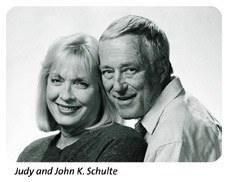 Their
generosity was inspired by two unrelated incidents. The wife
of one of John Schulte's long-time business associates developed
cancer. After obtaining information about cancer centers and
various treatments from the National Cancer Institute, the answer
was clear: The UM/Sylvester Comprehensive Cancer Center would
provide her with the best available care. What's more, the Schultes
used this information to begin their subsequent research and
multiple organ donation program.
Their
generosity was inspired by two unrelated incidents. The wife
of one of John Schulte's long-time business associates developed
cancer. After obtaining information about cancer centers and
various treatments from the National Cancer Institute, the answer
was clear: The UM/Sylvester Comprehensive Cancer Center would
provide her with the best available care. What's more, the Schultes
used this information to begin their subsequent research and
multiple organ donation program.
Next came a friend who had been suffering from vertigo incidents but who felt she was not receiving satisfactory answers from various specialists. Due to the language barrier, the Schultes accompanied her on her medical visits, which culminated with a referral to Thomas Balkany, M.D., Hotchkiss professor, vice chairman of the Department of Otolaryngology, and director of the University of Miami Ear Institute.
"What a difference," says John Schulte. "Dr. Balkany talked to us extensively, arranged numerous tests, and correctly diagnosed a growth on a nerve between the ear and the brain. A highly-specialized operation at the School of Medicine returned her to excellent health."
Then, several months ago, the painful news of cancer hit home--Judy Schulte's brother was unexpectedly diagnosed with an aggressive cancer. According to the Schultes, the care he received at UM/Sylvester--namely by Hugo Fernandez, M.D., and Lynda Oliveros, R.N., of the bone marrow transplant program--was outstanding.
The couple has since been working to spread the word of the quality of care available at the school. "Every great city should have a world-class academic medical center, and now that the school has accomplished that, it is equally important that we convey to South Floridians that Greater Miami has such a facility and those who can, should complete the circle," says John Schulte.
Photography by Ray Fischer
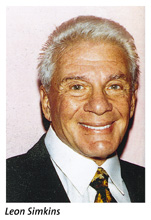 Diabetes
Research Institute Names Tower
Diabetes
Research Institute Names Tower
![]() long-time supporter of the Diabetes Research Institute (DRI)
and a member of its honorary board of trustees, Leon Simkins
recently donated $5 million to the DRI through his family's foundation.
Simkins announced the gift to a group of 900 guests during the
DRI's 25th anniversary celebration. Simkins' gift earned him
the honor of naming the institute's research tower the Leon J.
Simkins Research Tower.
long-time supporter of the Diabetes Research Institute (DRI)
and a member of its honorary board of trustees, Leon Simkins
recently donated $5 million to the DRI through his family's foundation.
Simkins announced the gift to a group of 900 guests during the
DRI's 25th anniversary celebration. Simkins' gift earned him
the honor of naming the institute's research tower the Leon J.
Simkins Research Tower.
"I recently made a visit to the DRI, and it seems they are on the verge of some major breakthroughs," says Simkins. "Now I can make a difference, and perhaps speed their progress toward a cure."
The DRI provides scientists with a unique opportunity to "fast track" their most promising basic science research findings by testing these new approaches in pre-clinical models and then in patients with diabetes.
Together with his wife, Serena, Simkins is a member of the DRI Foundation's Leadership Council, which includes donors who have made contributions of $1 million or more.
Physician-Scientist Program Reaffirms School's Commitment to Research
![]() reated
to actively support promising young physicians who are likely
to succeed as basic scientists or clinical investigators, the
Physician-Scientist Program was designed to ensure that the school
attracts and supports physician-scientists to carry out important
translational research. The initiative also will ensure that
physician-scientists use their investigative skills and corresponding
projects to support the priorities of the school's research enterprise.
reated
to actively support promising young physicians who are likely
to succeed as basic scientists or clinical investigators, the
Physician-Scientist Program was designed to ensure that the school
attracts and supports physician-scientists to carry out important
translational research. The initiative also will ensure that
physician-scientists use their investigative skills and corresponding
projects to support the priorities of the school's research enterprise.
The medical school is responsible for producing eminent physician-scientists who can transfer laboratory discoveries to the patient as well as bring insights from the clinical arena back to the lab. To achieve this, Dean John Clarkson is investing resources in translational research through the Physician-Scientist Program. If they are to achieve their research objectives, physician-scientists will require "protected" time to contribute to the medical enterprise. In response to this need, the School of Medicine intends to bolster the work of researchers through a series of grants. While most of the scientists will be based in the Department of Medicine, the largest department of the medical school, their research will be interdisciplinary.
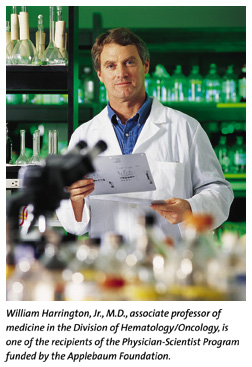 The
dean has already committed funds to physician-scientists who
possess both the skill and propensity to achieve the most relevant
and valued research objectives. If more philanthropic support
is directed to the development of such high-caliber science,
the school will meet its objective of engaging in cutting-edge
scientific endeavors with direct application to patient care.
The
dean has already committed funds to physician-scientists who
possess both the skill and propensity to achieve the most relevant
and valued research objectives. If more philanthropic support
is directed to the development of such high-caliber science,
the school will meet its objective of engaging in cutting-edge
scientific endeavors with direct application to patient care.
The first gift to the Physician-Scientist Program came from the Applebaum Foundation, in memory of the late Joseph Applebaum. With this $300,000 gift, the program has offered its first round of funding. Some of the recipients of this funding include William J. Harrington, Jr., M.D., associate professor of medicine, Division of Hematology/Oncology and leader of the Retroviral Related Malignancies Program at the University of Miami Sylvester Comprehensive Cancer Center. Dr. Harrington is involved in the study of lymphogenesis in relation to immune surveillance, particularly the factors modifying immune surveillance and the role of the Epstein-Barr virus in large cell AIDS-associated lymphoma.
Another recipient is Catherine F. Welsh, M.D., clinical instructor of medicine, Division of Hematology/Oncology and the recipient of the American Society of Clinical Oncology Career Development Award in 1997. Dr. Welsh studies breast cancer and the mechanisms underlying uncontrolled growth of malignant cells. She and her colleagues are studying the pathways inside breast cancer cells that are responsible for such uncontrolled growth, which will hopefully lead to new and more effective therapeutic targets.
Marilyn K. Glassberg, M.D., assistant professor of medicine, Division of Pulmonary Medicine, focuses her research on the molecular genetics and regulation of airway smooth muscle. As a pulmonologist, she is interested in substances made in our bodies that change and remodel the architecture of the lung leading to common diseases such as asthma and rare lung diseases such as lymphangioleiomyomatosis. In order to develop newer therapeutic strategies in disease treatment, Dr. Glassberg is studying how these substances, which originate within the body, conduct and organize their ongoing functions.
For more information on the Physician-Scientist Program, please contact David Chodrow, director of development for the Department of Medicine, at 305-243-6256.
Alumni Association Honors 1999 Hall of Fame Inductees
![]() he
Medical Alumni Association held its fourth annual Hall of Fame
dinner at the Coral Gables Omni Colonnade Hotel in May, during
the School of Medicine's commencement weekend. In recognition
of outstanding achievements and contributions to their profession
and communities, alumni and their guests gathered to honor Barry
W. Festoff, M.D. '66, and Andres Pumariega, M.D. '76.
he
Medical Alumni Association held its fourth annual Hall of Fame
dinner at the Coral Gables Omni Colonnade Hotel in May, during
the School of Medicine's commencement weekend. In recognition
of outstanding achievements and contributions to their profession
and communities, alumni and their guests gathered to honor Barry
W. Festoff, M.D. '66, and Andres Pumariega, M.D. '76.
Alan Serure, M.D. '79, president of the Medical Alumni Association, addressed the challenges of reaching out to alumni in Florida as well as nationwide. Building relationships with alumni across the country was clearly demonstrated by this year's choice of Hall of Fame honorees.
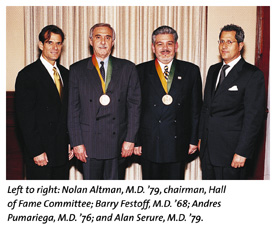 Barry
W. Festoff, M.D. '66, serves as chief, Neurology Service and
director of the Neurobiology Research Laboratory in the Department
of Veterans Affairs (VA) and is associate professor of neurology
at the University of Kansas Medical Center, where he is also
a professor in the Departments of Pharmacology, Toxicology, and
Therapeutics. Dr. Festoff is recognized internationally as a
bench research neurobiologist for his work on the neurobiological
mechanisms of neurological and neurogenetic disorders, neurotrophic
interactions, neuron target cell relationships, molecular correlates
of peripheral and nervous system regeneration, aging and the
nervous system, and the underlying mechanisms for cell death
in traumatic brain and spinal cord injury.
Barry
W. Festoff, M.D. '66, serves as chief, Neurology Service and
director of the Neurobiology Research Laboratory in the Department
of Veterans Affairs (VA) and is associate professor of neurology
at the University of Kansas Medical Center, where he is also
a professor in the Departments of Pharmacology, Toxicology, and
Therapeutics. Dr. Festoff is recognized internationally as a
bench research neurobiologist for his work on the neurobiological
mechanisms of neurological and neurogenetic disorders, neurotrophic
interactions, neuron target cell relationships, molecular correlates
of peripheral and nervous system regeneration, aging and the
nervous system, and the underlying mechanisms for cell death
in traumatic brain and spinal cord injury.
Andres Pumariega, M.D. '76, is chair of the Department of Psychiatry and Behavioral Sciences at the James H. Quillen College of Medicine at East Tennessee State University. He is the first Cuban-American to chair an academic department of psychiatry in the United States. Dr. Pumariega is recognized nationally for his research in cross-cultural child mental health, public systems of care for children's mental health, and eating and psychiatric disorders in medically ill children.
Before the inductees accepted their medals, Dean John Clarkson, M.D. '68, applauded their achievements and spoke about the priorities of a research university. He commented on the $130 million in grants the medical school had received as well as the ongoing plans to reach out to alumni across the nation.
Hall of Fame Nominations
Alumni receiving the Hall of Fame award in the year 2000 will enjoy a special place in the School of Medicine's history.
To be eligible for membership in the Hall of Fame, outstanding graduates must meet various criteria. Potential recipients of this award, for example, must have graduated from the University's School of Medicine a minimum of ten years ago and have a record of an outstanding contribution to, or responsibility for, a significant advancement in the medical profession, the community, or society as a whole as a result of their medical education.
If you know of a graduate who merits a nomination, contact Blaise Fallon at 305-243-6256.
![]() ohn K.
Robinson, M.D., former associate dean for student affairs at
the School of Medicine, died on April 2, 1999, from cancer complications
at the age of 75. Thousands of School of Medicine alumni are
saddened by his death.
ohn K.
Robinson, M.D., former associate dean for student affairs at
the School of Medicine, died on April 2, 1999, from cancer complications
at the age of 75. Thousands of School of Medicine alumni are
saddened by his death.
"During his entire career at UM, making students' medical school experiences fulfilling and trouble-free was Dr. Robinson's passion," says John G. Clarkson, M.D., senior vice president for medical affairs and dean of the school.
Dr. Robinson is survived by his wife of 37 years, Nettie Belle Robinson, and two sons, John Knox Robinson, Jr., and wife, Lisa; and Lieutenant Whitley Hjort Robinson.
Donations in his memory may be made to the John K. Robinson Loyalty Loan Fund, University of Miami School of Medicine, Post Office Box 016960 (R-100), Miami, Florida 33101.
Prominent Law Firm Supports Batchelor Children's Center
![]() he
Miami-based law firm of Sheftall, Alvarez, and Torres has donated
$161,000 to benefit the Batchelor Children's Center, a center
that supports children's health. The gift will help fund a new
waiting area in the Pediatric Infectious Diseases and Immunology
wing of the new pediatric research center. Construction of the
center began in late April.
he
Miami-based law firm of Sheftall, Alvarez, and Torres has donated
$161,000 to benefit the Batchelor Children's Center, a center
that supports children's health. The gift will help fund a new
waiting area in the Pediatric Infectious Diseases and Immunology
wing of the new pediatric research center. Construction of the
center began in late April.
Scott Sheftall, along with his partners Richard Alvarez and Brian Torres, opened their civil litigation firm in 1996 with the vision that there is more to law than just earning a good salary. The partners share a strong commitment to the community and engage in charitable endeavors.
Their creativity and interest in serving others also led them to devise and negotiate agreements whereby residual funds from recently settled class action suits would be directed to benefit charities.
Sheftall's decision to support the center was inspired by his experience and knowledge of the high quality, specialized treatment children receive at the Department of Pediatrics. Earlier in his career, Sheftall represented a young boy who sustained serious arm and hand injuries. He later represented a child with bilateral hearing loss, both of whom were treated at the department's Mailman Center for Child Development.
Sheftall's commitment to bettering the lives of children was later galvanized when Dr. R. Rodney Howell, chairman of the Department of Pediatrics, asked him to join the Children's Council, a group of volunteer community leaders dedicated to furthering the department's mission.
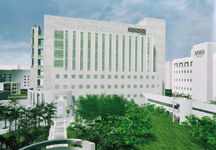 As
a young lawyer in Miami, Sheftall was drawn to the crusade for
improved health care by one of his mentors, attorney Bill Frates,
who was then chairman of the Public Health Trust. "I am
grateful for the example Bill set for the young lawyers in his
firm to be involved in community service as well as the opportunity
Rod Howell has given me to be on the inside of such an exciting
project for the children of Florida," Sheftall says.
As
a young lawyer in Miami, Sheftall was drawn to the crusade for
improved health care by one of his mentors, attorney Bill Frates,
who was then chairman of the Public Health Trust. "I am
grateful for the example Bill set for the young lawyers in his
firm to be involved in community service as well as the opportunity
Rod Howell has given me to be on the inside of such an exciting
project for the children of Florida," Sheftall says.
Developing a World-Class Research Facility for Children
The Batchelor Children's Center-Comprehensive Research Institute will be a state-of-the-art, 151,000-square-foot facility, housing bench and clinical research activities for the Department of Pediatrics. This facility will allow for more collaboration and communication among scientists within the Department of Pediatrics and permit the sharing of knowledge and equipment, while also providing education and training. It also will allow for the development of research programs that address childhood problems and proposed solutions.
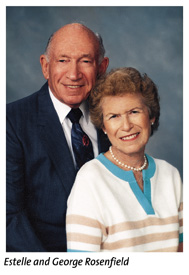 New
Center for Digestive Disorders Consolidates Services
New
Center for Digestive Disorders Consolidates Services
![]() stelle
and George Rosenfield pledged $500,000 in late 1998 to create
the Estelle and George Rosenfield Center for Digestive Disorders,
an innovative facility that will provide integrated, coordinated
care for patients who require either outpatient or surgical services.
The Rosenfields joined faculty and staff for the dedication of
the center last June.
stelle
and George Rosenfield pledged $500,000 in late 1998 to create
the Estelle and George Rosenfield Center for Digestive Disorders,
an innovative facility that will provide integrated, coordinated
care for patients who require either outpatient or surgical services.
The Rosenfields joined faculty and staff for the dedication of
the center last June.
Located in the University of Miami Hospital and Clinics (UMHC), the Estelle and George Rosenfield Center for Digestive Disorders reflects a "consolidation of services" philosophy. Patients will benefit from the physical proximity of this outpatient clinic to the surgical facility and radiology services. Under the direction of Arvey Rogers, M.D., chief of the Division of Gastroenterology, the center will also provide specialists in behavior modification and nutritional counseling.
The Rosenfields, residents of Coral Gables, Florida, founded TASCO Sales, an optical equipment company that distributes binoculars, telescopes, and microscopes. They sold the company in 1996 and are now retired. They are pleased to be able to support the work of the Division of Gastroenterology, which was recently ranked as one of the best in the nation by U.S. News and World Report. The couple consider the Estelle and George Rosenfield Center for Digestive Disorders a fitting tribute to Dr. Rogers and his staff.
Alumni Reconnect at Gatherings in Miami and Los Angeles
![]() n a warm,
collegial setting, Miami-Dade alumni gathered last March at the
Cocoplum Clubhouse in Coral Gables, Florida, to socialize and
honor distinguished alumni. Alan Serure, M.D. '79, president
of the medical alumni association, along with his wife, Karen,
hosted the event, which offered the opportunity to honor Eugene
"Bucky" Bloom, M.D. '60, Stephen J. Dresnick, M.D.
'75, and Arthur I. Gilbert, M.D. '57.
n a warm,
collegial setting, Miami-Dade alumni gathered last March at the
Cocoplum Clubhouse in Coral Gables, Florida, to socialize and
honor distinguished alumni. Alan Serure, M.D. '79, president
of the medical alumni association, along with his wife, Karen,
hosted the event, which offered the opportunity to honor Eugene
"Bucky" Bloom, M.D. '60, Stephen J. Dresnick, M.D.
'75, and Arthur I. Gilbert, M.D. '57.
At the event, Dr. Serure expressed the importance of reconnecting alumni to the School of Medicine by reinforcing the common allegiance they share. He stressed the need to heighten awareness of activities at the school and for alumni to focus on the school's priorities and challenges throughout the 21st century.
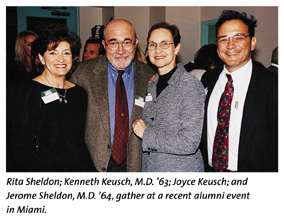 Dean
John Clarkson, M.D. '68, carried through with this theme as he
described the medical school's initiatives. He also introduced
a group of medical school students, who later talked about their
professional aspirations. The gathered alumni enjoyed hearing
from these ambitious physicians-in-training, perhaps reminding
them of earlier days at the School of Medicine.
Dean
John Clarkson, M.D. '68, carried through with this theme as he
described the medical school's initiatives. He also introduced
a group of medical school students, who later talked about their
professional aspirations. The gathered alumni enjoyed hearing
from these ambitious physicians-in-training, perhaps reminding
them of earlier days at the School of Medicine.
Alumni also met with Dean Clarkson in April at a gathering held at Chasen's Restaurant in Beverly Hills, California. The event provided an opportunity for the dean to discuss the school's research priorities, the achievements of medical school students, and the importance of maintaining contact with alumni outside of Florida. Dr. Clarkson and his wife, Diana, along with Trisha Rothenberg Roth, M.D. '69, hosted the reception for the group of alumni and their guests. The evening event helped to reunite graduates who had not seen or heard from each other in many years.
Dr. Clarkson is interested in hearing from other alumni in the California area and looks forward to hosting other events in the near future. For further information on meeting with the dean and assisting the school in its outreach efforts, please contact Blaise Fallon in the Office of Medical Alumni Relations at 305-243-6256.